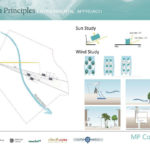Location: Hawar Islands, Bahrain
Deliverable: Master plan, infrastructure design
Key Features: sustainable infrastructure master planning, passive urban grid design, integrated ecosystem management, renewable energy
The Dannat Hawar Island Resort covers 1,215ha and includes three hotels, mid-density residential blocks, an eco-desert camp, a museum, a traditional souk, and community facilities and mosques spread throughout the development. This second home and holiday resort is a car-free environment and is planned such that the entire development can be supplied by renewable energy sources. The master planning of the Island is based on a self-sufficient scheme because of the remote nature of the islands and the associated cost of transporting goods and services to and from these locations.
To address demand side management of energy and water consumption, the Dannat Hawar Master Plan incentivized building energy reductions by allowing for an increased GFA in identified asset classes if specific building energy targets can be met. In terms of supply, the Dannat Hawar Development is an ideal setting for the use of renewable energy infrastructure because of its remote location and the phased manner of the project. The varied developments of the Master Plan elements lend themselves to different supply schemes for various living quarters and resort components. Similarly, the infrastructure supply strategy of the Al Maha Desert Camp is based as much as possible on biological processes and renewable sources, aiming to emulate the traditional ‘Bedouin’ lifestyle and a strong connection with the desert ecosystem processes. The overall supply side strategy for the Mainland and Townhouse Islands is the most traditional of the three strategies because of density and the associated efficiencies. The infrastructure systems will be grid based with inputs from renewable sources where feasible.
By incentivizing building energy reductions and taking a development site specific approach to infrastructure supply, the Dannat Hawar Master Plan will minimize energy and water consumption and associated carbon emissions and environmental impacts.


